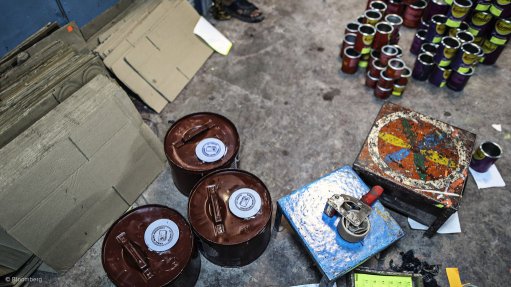
GLOBAL CORROSION PROBLEM ADDRESSED
npj Materials Degradation open access journal covers the the field of materials degradation across both metallic and nonmetallic materials
Photo by: Bloomberg
Owing to corrosion costing companies more than $2-trillion a year globally, high-impact scientific and medical information publisher Nature Publishing Group (NPG) – part of scientific publishing company Springer Nature Corrosion – has reached an agreement with the Chinese Society for Corrosion and Protection (CSCP) to help address this global problem by copublishing ‘npj Materials Degradation’ in June.
The publication will be the first highly selective and open-access journal in the field of materials degradation, with the most extensive coverage across both metallic and nonmetallic materials.
“Despite the impact corrosion can have on many industries, our understanding of the fundamental underlying mechanisms is limited by insufficient sharing of knowledge within the anti-degradation community,” says CSCP president Dr Fuhui Wang.
He adds that this hinders the CSCP’s ability to develop effective measures to mediate and control degradation.
Founded in 1979, the CSCP is a national nonprofit organisation dedicated to advancing corrosion mitigation in China and globally through promoting corrosion research and education. It is a Tier-1 society under the administration of China Association for Science and Technology.
CSCP has been the central network for corrosion scientists and engineers in China and currently consists of over 20 000 individual members and 1 600 group members from both academia and industries. CSCP has five working committees, 21 technical committees focusing on different subtopics of corrosion research, and also an overseas branch represented by worldwide corrosion experts.
Wang notes that the company is excited to partner with NPG in launching such an open access journal, which means all the cutting-edge discoveries and best solutions in the field will become accessible to all people freely and without any boundaries.
The npj Materials Degradation journal aims to publish top-quality peer-reviewed original papers, review articles and short communications describing basic research discovery and technology in the area of corrosion and protection of metallic and nonmetallic materials, particularly the breakthroughs that provide new insights into the study of materials failure.
“The journal comes at the right time, as recent years have seen a tremendous boost in the quantity, quality and diversity of degradation-related research. With its unique positioning, the journal will become an indispensable platform for scientists globally to share knowledge, improve research efficiency and increase the visibility of their findings,” comments Springer Nature Corrosion executive editor Nick Campbell.
Monash University, in Australia, professor Nick Birbilis, together with Dr Stéphane Gin from the French Atomic Energies and Alternatives Energy Commission (CEA), have been appointed as co-editors-in-chief for the new journal.
The topics covered by the journal will include theoretical, experimental and simulation studies on fundamental mechanisms and kinetics of corrosion and degradation of natural and synthetic metallic and nonmetallic materials; characterisation of corrosion (degradation) from nanoscale and atomic scale to macroscopic scale; corrosion control, including through advanced materials and technologies; inspection and monitoring, including sensing technologies; environmental stability and durability of advanced materials and emerging applications; long-term stability and durability of all kinds of materials hosting nuclear waste.